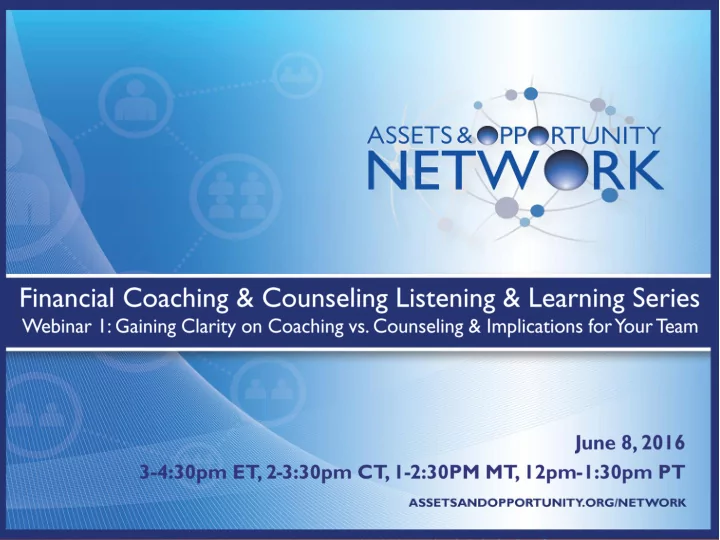

• • • •
Who We Are Our mission at CFED is to make it possible for millions of people to achieve financial security and contribute to an opportunity economy.
How do we do it We push to expand innovative practical solutions that empower low- and moderate-income people to build wealth. We drive policy change at all levels of government. We support the efforts of community leaders across the country to advance economic opportunity for all.
• • •
UW-Extension Financial Coaching Strategies Website: http://fyi.uwex.edu/financialcoaching/ Center for Financial Security School of Human Ecology 1300 Linden Drive Madison, WI 53706 cfs@mailplus.wisc.edu http://www.cfs.wisc.edu/
• • • • •
Hallie Lienhardt, Outreach Specialist Center for Financial Security University of Wisconsin-Madison Presents:
CENSUS BACKGROUND • Collaborative effort between CFS, Asset Funders Network, • Consists of three 10 question and the Annie E. Casey tracks: Foundation o Funders of Financial • Developed with stakeholder Coaching input and feedback o Manager/Leaders of • Electronic Survey Coaching Programs • Distributed widely o Practitioners of Financial Coaching
WHO PARTICIPATED?
WHAT IS THE SIZE AND SCOPE OF THE FIELD? • Median of 4 coaches per • Median of 30 clients coached organization per month by organizations • 1,705 coaches nationally • 10,230 clients receive financial coaching services per month by • Median of 14.5 clients per participating organizations` month
ADDITIONAL RESOURCES: • Full Results Brief: https://cfs.wisc.edu/2016/05/19/financial- coaching-census-2015-results-brief/ • Recorded Webinar: http://assetfunders.org/connect/financial- coaching-census • Slideshow from Webinar: http://assetfunders.org/images/pages/AFN_Financial_Coaching_C ensus_Webinar_5.18.16.pdf
Elements of Financial Coaching: • Client-driven process • Method of self-directed behavior change • Focus on personalized financial goals related to improving financial well-being • Coaches do not provide financial expertise/advice • Coaches offer tools and resources • Coaches provide encouragement and monitoring
Financial Coaching Financial Counseling Financial Education Client Status Client stable, but Client in crisis Client stable, but seeking improvement seeking specific information Objective Client defined Counselor defined Client identified topic with educator defined information Length of More than two regularly One-time session, One or two set Engagement scheduled sessions often “drop - in” sessions/workshops Dialogue Active listening and More didactic More didactic, carefully directed and prescriptive prescriptive, questions to guide and typically with a set self-reflection topic identified Monitoring and Follow up and Ad hoc; general Client chooses what Self-control accountability are assumption is client to do with information, explicit and planned will follow through carries out actions for each session on intentions independently
ADDITIONAL RESOURCES: • What is financial coaching?: http://fyi.uwex.edu/financialcoaching/what-is-coaching/ • Financial Coaching: Review of Existing Research: http://fyi.uwex.edu/financialcoaching/financial-coaching-review- of-existing-research/ • Financial Coaching Demonstration Videos: http://fyi.uwex.edu/financialcoaching/learning-to-be-a- coach/financial-coaching-demonstration-videos/
POLL & DISCUSSION
DISCUSSION
CENSUS RESULTS: HOW ARE PROGRAMS OFFERING COACHING? • PAID STAFF, VOLUNTEER, SERVICE POSITION, INTERNS OR 3 RD PARTY ORG: 65% of Managers and 88% of Coaches chose Paid staff, Volunteer chosen by 21% and 6% • STAND ALONE SERVICE OR BUNDLED: 86% of Managers and 81% of Coaches chose Integrated or Bundled with other services • ONLINE, IN PERSON, GROUP, TELEPHONE, OR OTHER: Telephone and In Person most commonly chosen by managers and coaches
@CFED facebook.com/CFEDNews cfed.org/blog/inclusiveeconomy
@CFED facebook.com/CFEDNews cfed.org/blog/inclusiveeconomy
@CFED facebook.com/CFEDNews cfed.org/blog/inclusiveeconomy
@CFED facebook.com/CFEDNews cfed.org/blog/inclusiveeconomy
@CFED facebook.com/CFEDNews cfed.org/blog/inclusiveeconomy
@CFED facebook.com/CFEDNews cfed.org/blog/inclusiveeconomy
@CFED facebook.com/CFEDNews cfed.org/blog/inclusiveeconomy
@CFED facebook.com/CFEDNews cfed.org/blog/inclusiveeconomy
@CFED facebook.com/CFEDNews cfed.org/blog/inclusiveeconomy
@CFED facebook.com/CFEDNews cfed.org/blog/inclusiveeconomy
@CFED facebook.com/CFEDNews cfed.org/blog/inclusiveeconomy
POLL & DISCUSSION
CENSUS RESULTS: HOW ARE COACHES BEING TRAINED?
POLL & DISCUSSION
ADDITIONAL RESOURCES: • Financial Coaching Training Curricula: Field Inventory and Summary Brief: http://fyi.uwex.edu/financialcoaching/training_curricula_brief/ • Training Opportunities: http://fyi.uwex.edu/financialcoaching/trainingopportunities/ • Financial Coaching Newsletter: http://fyi.uwex.edu/financialcoaching/category/newsletter/
• POLL & DISCUSSION
POLL & DISCUSSION
COACHING COMPETENCIES: • Nonjudgmental • Good Listener • Personable • Flexible • Inquisitive
DISCUSSION
POLL & DISCUSSION
• • •
Recommend
More recommend